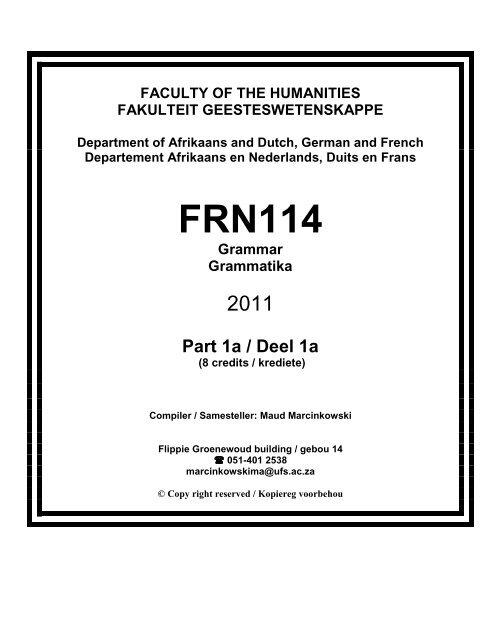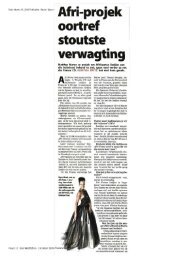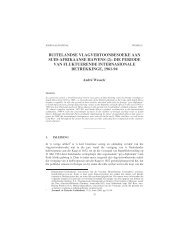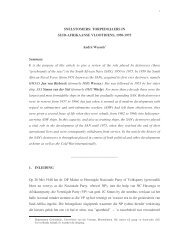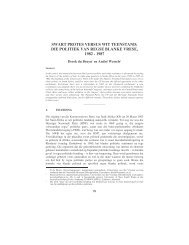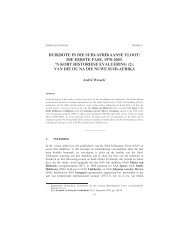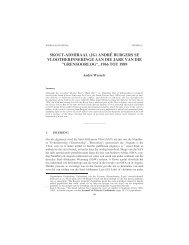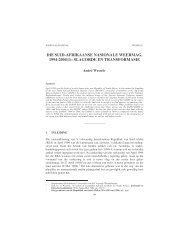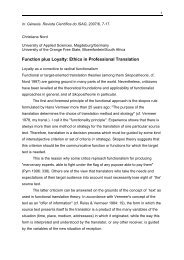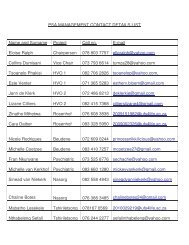Study guide FRN114 Grammar/Grammatika - Faculty of The ...
Study guide FRN114 Grammar/Grammatika - Faculty of The ...
Study guide FRN114 Grammar/Grammatika - Faculty of The ...
Create successful ePaper yourself
Turn your PDF publications into a flip-book with our unique Google optimized e-Paper software.
FACULTY OF THE HUMANITIES<br />
FAKULTEIT GEESTESWETENSKAPPE<br />
Department <strong>of</strong> Afrikaans and Dutch, German and French<br />
Departement Afrikaans en Nederlands, Duits en Frans<br />
<strong>FRN114</strong><br />
<strong>Grammar</strong><br />
<strong>Grammatika</strong><br />
2011<br />
Part 1a / Deel 1a<br />
(8 credits / krediete)<br />
Compiler / Samesteller: Maud Marcinkowski<br />
Flippie Groenewoud building / gebou 14<br />
051-401 2538<br />
marcinkowskima@ufs.ac.za<br />
© Copy right reserved / Kopiereg voorbehou
IMPORTANT INFORMATION: <strong>FRN114</strong> (2011)<br />
THE GRAMMAR SECTION OF THIS MODULE MAKES UP 8 OF THE 16 CREDITS FOR THIS<br />
MODULE. ALL THE INFORMATION IN THIS GUIDE PERTAINS TO THE GRAMMAR SECTION<br />
ONLY.<br />
During the first year, all classes are presented in Afrikaans (morning classes) and English (evening classes)<br />
except for the practical classes which will be bilingual. Students can therefore choose which <strong>of</strong> the classes they<br />
want to attend according to their time-tables.<br />
1. PRESCRIBED TEXTBOOKS<br />
<strong>The</strong> following textbooks are prescribed:<br />
2. LECTURERS<br />
+<br />
- A. Berthet, C. Hugot, V. Kizirian, B. Sampsonis & M.<br />
Waendendries. Alter Ego 1 - Livre élève. Hachette.<br />
- A. Berthet, C. Hugot, B. Sampsonis & M. Waendendries.<br />
Alter Ego 1 - Cahier d'activités. Hachette<br />
<strong>The</strong>se books are available from Van Schaik’s on campus.<br />
Afrikaans grammar and practical classes English grammar and practical classes<br />
Ms. Anne Gauert<br />
Office: FGG 15A<br />
- 1 -<br />
Ms. Maud Marcinkowski<br />
Office: FGG 14<br />
<strong>The</strong> lecturers’ consultation hours will be posted outside FGG 14/15A as soon as the time tables have been<br />
finalised (within the first weeks <strong>of</strong> the semester). Students are welcome to contact either <strong>of</strong> the lecturers<br />
concerning the grammar classes or homework.<br />
3. ASSISTANTS<br />
Ms. Loraine Bester and Ms. Isabel Mostert<br />
Office: FGG 15<br />
Telephone: 051-401 9022 (mornings)<br />
If students experience any problems related to this module, they are invited to contact the lecturer before<br />
or after classes or during consultation hours. Alternatively they could leave a message and telephone number with<br />
the student assistant in FGG15. <strong>The</strong> lecturer will then contact the student to discuss the matter.<br />
4. ASSESSMENT GUIDELINES<br />
A new back-to-back examination system will be implemented at the University <strong>of</strong> the Free State as from<br />
2011. This implies a compulsory attendance at the first examination opportunity. Admission to the additional<br />
examination opportunity (aegrotat; deferred or special examination) will only be possible if a student submits<br />
a written application on the required application documents. Complete policy documents and <strong>of</strong>ficial<br />
communication will go out to all students early in 2011. It remains the responsibility <strong>of</strong> each student to<br />
familiarise him-/herself with the new examination system and policy.
Module mark: Average <strong>of</strong> marks obtained throughout the semester for the two parts <strong>of</strong> the module:<br />
Part 1. <strong>Grammar</strong> + Part 2. Culture & Literature.<br />
<strong>The</strong> following make up the 100 marks <strong>of</strong> your semester mark for the module:<br />
(Average mark for part 1 + average mark for part 2) ÷ 2 = semester mark out <strong>of</strong> 100<br />
Semester marks out <strong>of</strong> 100 for part 1:<br />
• Two semester tests <strong>of</strong> 55 marks each (55%)<br />
Please note that there are three (3) test opportunities scheduled on the programme. Students have to<br />
write at least two (2) <strong>of</strong> these tests. If a student writes all three tests, the best two marks will be used to<br />
calculate the semester mark.<br />
NO SICK TEST WILL BE WRITTEN. IT IS THE STUDENT’S RESPONSIBILITY TO ORGANISE<br />
ACTIVITIES IN SUCH A WAY AS TO ASSURE THAT HE/SHE WRITES AT LEAST TWO TESTS.<br />
• One oral assessment <strong>of</strong> 15 marks (15%).<br />
• Written homework <strong>of</strong> 10 marks each (10%).<br />
• Work done in tutor classes once a week (10%)<br />
• Work done in resource centre (5%)<br />
• Attendance (5%)<br />
Marks out <strong>of</strong> 100 for part 2: (Please refer to the manual for this part <strong>of</strong> the module.)<br />
Examination mark: Mark out <strong>of</strong> 100 [(Paper 1 + Paper 2) ÷ 2] obtained during one <strong>of</strong> the examination sessions.<br />
Important information concerning the examinations:<br />
This module comprises two examination papers. <strong>The</strong> examination in both papers must be written during the<br />
same examination opportunity. If a student qualifies for a re-assessment in this module, he/she must write the<br />
examination in both papers during the re-assessment. (See Regulation A15, T15)<br />
A subminimum <strong>of</strong> 45% is required for paper 1 (<strong>Grammar</strong>) AND paper 2 (Culture & Literature). This means<br />
that a student cannot pass the module if he/she obtains a mark <strong>of</strong> less than 45% for this paper during the<br />
examination.<br />
A student who participated in the first scheduled examination opportunity in a given semester, obtained a final<br />
mark <strong>of</strong> at least 50 percent, but did not obtain the required subminimum <strong>of</strong> 45% (as stipulated in the study<br />
<strong>guide</strong>) in the examination, can participate in the second examination opportunity. (Regulation A 15 (e))<br />
No minimum semester mark is required in order to gain access to the examination.<br />
Final mark: A combination <strong>of</strong> the module (50%) and examination marks (50%).<br />
5. WEEKLY HOMEWORK<br />
Except for the first 3 pieces <strong>of</strong> homework, homework is to be done in class (see programme for dates). Students<br />
can attend either the morning or evening class as they will be bilingual on this day. THE HOMEWORK IS<br />
HANDED IN AT THE END OF THE CLASS TO BE EVALUATED. NO HOMEWORK DONE OUTSIDE OF<br />
THESE CLASS TIMES WILL BE ACCEPTED.<br />
6. TUTOR<br />
<strong>The</strong> tutor for <strong>FRN114</strong> is Isabel Mostert (MostertIMM@ufs.ac.za). <strong>The</strong>re are weekly tutor sessions which must be<br />
attended, as it counts 10% <strong>of</strong> your GRAMMAR module mark. Only work completed during the session will be<br />
marked. All work handed in late will not be taken into account, unless a prior arrangement has been made with<br />
the tutor. Students are encouraged to use these sessions to ask questions about the course work that they do not<br />
understand.<br />
- 2 -<br />
Bonne découverte!
BELANGRIKE INLIGTING: <strong>FRN114</strong> (2011)<br />
DIE GRAMMATIKA AFDELING VAN HIERDIE MODULE BESTAAN UIT 8 VAN DIE 16 KREDIETE<br />
VIR HIERDIE MODULE. DIE INLIGTING IN HIERDIE GIDS IS SLEGS VAN TOEPASSING OP DIE<br />
GRAMMATIKA AFDELING.<br />
In the eerste jaar sal alle klasse in beide Afrikaans (oggend-klasse) en Engels (aand-klasse) aangebied word<br />
met uitsondering van die praktiese klasse wat tweetalig sal wees. Studente kan dus volgens hulle klasrooster<br />
besluit watter klasse hul wil bywoon.<br />
1. VOORGESKREWE HANDBOEKE<br />
Die volgende handboeke is voorgeskryf:<br />
2. DOSENTE<br />
+<br />
- A. Berthet, C. Hugot, V. Kizirian, B. Sampsonis & M.<br />
Waendendries. Alter Ego 1 - Livre élève. Hachette.<br />
- A. Berthet, C. Hugot, B. Sampsonis & M. Waendendries.<br />
Alter Ego 1 - Cahier d'activités. Hachette<br />
Hierdie boeke is beskikbaar by Van Schaik’s op kampus.<br />
Afrikaanse grammatika en praktiese klasse Engelse grammatika en praktiese klasse<br />
Ms. Anne Gauert<br />
Kantoor : FGG 15A<br />
- 3 -<br />
Ms. Maud Marcinkowski<br />
Kantoor: FGG 14<br />
Die dosente se spreekure sal buite FGG 14/15A aangebring word sodra die roosters gefinaliseer is (binne die<br />
eerste weke van die semester). Studente is welkom om enige van die dosente te kontak rakende die grammatika<br />
klasse <strong>of</strong> die huiswerk.<br />
3. ASSISTENTE<br />
Ms. Loraine Bester and Ms. Isabel Mostert<br />
Kantoor: FGG 15<br />
Telefoonnommer: 051-401 9022 (soggens)<br />
Indien studente enige probleme rakende hierdie module ondervind, is hulle welkom om die dosent voor <strong>of</strong> na<br />
klas <strong>of</strong> tydens spreekure te kontak. Alternatiewelik kan hulle ‘n boodskap met ‘n kontaknommer by die studenteassistant<br />
in FGG15 laat. Die dosent sal die student dan kontak om die saak te bespreek.<br />
4. ASSESSERINGSRIGLYNE<br />
Vanaf 2011 word 'n nuwe rug-aan-rug eksamenstelsel by die Universiteit van die Vrystaat geïmplementeer. Dit<br />
impliseer dat studente verplig is om tydens die eerste geleentheid te skryf en slegs deur middel van 'n<br />
skriftelike aansoek toelating tot die aanvullende eksamen (aegrotat; her-eksamen; spesiale eksamen) sal kan<br />
bekom. Aansoeke moet op die voorgeskrewe dokumente ingedien word. Volledige beleidsdokumente en<br />
amptelike skrywes sal vroeg in 2011 na alle studente uitgestuur word. Dit bly elke student se<br />
verantwoordelikheid om hom-/haarself te vergewis van die nuwe eksamenstelsel en -beleid.
Module-punt: Gemiddeld van die punte wat deur die loop van die semester behaal is vir die twee dele van die<br />
module: 1. <strong>Grammatika</strong> + 2. Kultuur & Literatuur.<br />
Die 100 punte van die semesterpunt vir die module word as volg bereken:<br />
(Gemiddelde punt vir Deel 1 + gemiddelde punt vir Deel 2) ÷ 2 = semesterpunt uit 100<br />
Die module-punt (uit 100) vir Deel 1:<br />
• Twee semestertoetse van 55 punte elk (55%)<br />
Let asseblief daarop dat daar drie (3) toetsgeleenthede op die program verskyn. Studente moet ten<br />
minste twee (2) hiervan skryf. Indien ‘n student al drie toetse skryf, sal die twee beste punte gebruik<br />
word om die semesterpunt te bereken.<br />
GEEN SIEKETOETS SAL GESKRYF WORD NIE. DIT IS DIE STUDENT SE<br />
VERANTWOORDELIKHEID OM SEKER TE MAAK DAT AKTIWITEITE SO BEPLAN WORD<br />
DAT HY/SY TEN MINSTE TWEE TOETSE SKRYF.<br />
• Een mondelinge evaluasie van 15 punte (15%)<br />
• Geskrewe huiswerk van 10 punte elk (10%)<br />
• Werk gedoen in tutorklasse een keer per week (10%)<br />
• Werk gedoen in bronnesentrum (5%)<br />
• Attendance (5%)<br />
Die module-punt (uit 100) vir Deel 2: (Verwys asb na die handleiding vir hierdie deel van die module)<br />
Eksamenpunt: ‘n Punt uit 100 [(Vraestel 1 + Vraestel 2) ÷ 2] behaal tydens een van die eksamengeleenthede.<br />
Belangrike inligting rakende die eksamen :<br />
Vir hierdie module word twee eksamenvraestelle geskryf. Beide die eksamenvraestelle moet gedurende dieselfde<br />
eksamengeleentheid afgelê word. Indien ‘n student kwalifiseer vir ‘n her-assessering in hierdie module, moet hy/sy<br />
beide die eksamenvraestelle gedurende die her-assessering skryf. (Sien Regulasie A15, T15)<br />
‘n Subminimum van 45% word vereis vir vraestel 1 (<strong>Grammatika</strong>) EN vraestel 2 (Kultuur & Literatuur). Dit<br />
beteken dat ‘n student nie die module kan slaag indien hy/sy ‘n punt van minder as 45% gedurende die eksamen<br />
behaal nie.<br />
‘n Studente wat aan die eerste geskeduleerde eksamengeleentheid in gegewe semester deelgeneem het, ‘n finale<br />
syfer van minstens 50 persent behaal het, maar nie vereiste subminimum van 45% (soos gestipuleer in die module<br />
handleiding) in die eksamen nie, kan weer aan die tweede eksamengeleenthied deelneem. Regulasie A 15 (e)<br />
Geen minimum semesterpunt word vereis om toelating tot die eksamen te verkry nie.<br />
Finale punt: ‘n Kombinasie van die modulepunt (50%) en die eksamenpunt (50%).<br />
5. WEEKLIKSE HUISWERK<br />
Behalwe vir die eerste 3 opdragte, word huiswerk in die klas gedoen (sien program vir datums). Studente kan die<br />
oggend- <strong>of</strong> aandklas bywoon aangesien beide tweetalig sal wees. DIE HUISWERK WORD AAN DIE EINDE<br />
VAN DIE KLAS INGEHANDIG OM GEEVALUEER TE WORD. GEEN HUISWERK WAT BUITE HIERDIE<br />
KLASTYE GEDOEN IS SAL AANVAAR WORD NIE.<br />
6. TUTOR<br />
Die tutor vir <strong>FRN114</strong> is Isabel Mostert (MostertIMM@ufs.ac.za). Daar is weeklikse tutor sessies wat bygewoon<br />
moet word, aangesien dit 10% van die finale GRAMMATIKA modulepunt tel. Slegs werk wat in die sessies<br />
voltooi word sal gemerk word. Alle werk wat laat ingehandig word sal nie in berekening geneem word nie, tensy<br />
daar vooraf ‘n reëling met die tutor aangegaan is. Studente word aangemoedig om die sessies tot hul voordeel<br />
te gebruik en vrae te vra oor die werk wat hulle nie verstaan nie.<br />
Bonne découverte!<br />
- 4 -
PROGRAMME/PROGRAM 2011<br />
Semaine Dates Travail prévu<br />
1 24/01-28/01<br />
2 31/01-04/02<br />
3 07/02-11/02<br />
Alter Ego 1, Fenêtre sur…<br />
Se présenter, p.11<br />
Épeler son nom et l’alphabet, p.11<br />
Dire quelle langue on parle, p.12<br />
Faire connaissance, dire la nationalité, p.12 > rejouer les scènes du dialogue<br />
Point Langue > les nationalités, p.13 + S’exercer nº1 p.15<br />
Point Langue > s’appeler / être, p.13 + S’exercer nº2 p.15<br />
Phonétique, p.13<br />
Identifier un nombre, compter, p.14/15<br />
Communiquer en classe, p.16<br />
Alter Ego 1, Dossier 1, Leçon 1, Sur le campus<br />
Saluer, p.18 nº1 → 3<br />
Homework to be handed in on Monday, 07/02<br />
Dictionary know-how (1) [see p.10 <strong>of</strong> this <strong>guide</strong>]<br />
Huiswerk wat op Maandag, 07/02 ingehandig moet word<br />
Hoe om 'n woordeboek te gebruik (1) [sien bl.10 van hierdie gids]<br />
Point culturel > tu / vous, p.19 + S’exercer, nº1 p.21<br />
Phonétique, p.18 & 19<br />
Aide-mémoire, p.19 + S’exercer, nº2 p.21<br />
Jeu de rôle, nº6 p.19<br />
Se présenter, p.20<br />
Homework to be handed in on Monday, 14/02<br />
Dictionary know-how (2) [see p.11/12 <strong>of</strong> this <strong>guide</strong>]<br />
Huiswerk wat op Maandag, 14/02 ingehandig moet word<br />
Hoe om 'n woordeboek te gebruik (2) [sien bl.11/12 van hierdie gids]<br />
- 5 -
PROGRAMME/PROGRAM 2011<br />
Semaine Dates Travail prévu<br />
4 14/02-18/02<br />
5 21/02-24/02<br />
6 28/02-04/03<br />
Point Langue > Avoir au présent, p.20 + S’exercer, nº3 p.21<br />
Vocabulaire, nº10 p.21<br />
Aide-mémoire, p.21<br />
Point Langue > article défini, p.21 + S’exercer, nº5 p.21<br />
Point Langue > négation, p.21 + S’exercer, nº4 p.21<br />
Alter Ego 1, Dossier 1, Leçon 2, M comme médiathèque<br />
Demander des informations, p.22 > rejouer les scènes du dialogue<br />
Point Langue > article indéfini, p.22<br />
Questionner sur l’identité, p.23 nº3 → 5<br />
Aide-mémoire, p.23 (+ nº7)<br />
TEST / TOETS 1 : Friday 18 February / Vrydag 18 Februarie 2011<br />
Alter Ego 1, Fenêtre sur… + Dossier 1, Leçon 1<br />
Point Langue > l’adjectif interrogatif, p.23 + S’exercer, p.25 nº1&2<br />
Comprendre / Dire des coordonnées, p.24<br />
Point Culture > numéros de téléphone, p.24<br />
Aide-mémoire, p24 + S’exercer, p.25 nº3<br />
Phonétique, p.25 nº12 / 14 + S’exercer, p.25 nº4<br />
À l’oral, dites votre numéro de téléphone et votre courriel.<br />
Alter Ego 1, Dossier 1, Leçon 3, En direct de TV5<br />
Donner des informations personnelles, p.26<br />
Homework to be handed in on Monday, 28/02<br />
Dictionary know-how (3) [see p.13/14 <strong>of</strong> this <strong>guide</strong>]<br />
Huiswerk wat op Maandag, 28/02 ingehandig moet word<br />
Hoe om 'n woordeboek te gebruik (3) [sien bl.13/14 van hierdie gids]<br />
Donner des informations personnelles, p.27 nº3&4<br />
Point Culture > la francophonie, p.27<br />
Point Langue > les prépositions + nom de pays, p.27 + S’exercer, nº1 p.29<br />
Exercices complémentaires<br />
Parler de ses passions et de ses rêves, p.28<br />
Aide-mémoire, p.28<br />
Point Langue > les verbes en –ER au présent, p.28 + S’exercer, nº2&3 p.29<br />
- 6 -
PROGRAMME/PROGRAM 2011<br />
Semaine Dates Travail prévu<br />
7 07/03-11/03<br />
8 14/03-18/03<br />
9 21/03-25/03<br />
Point Langue > Être et avoir, p.29 + S’exercer, nº4&5 p.29<br />
Phonétique, p.29<br />
Alter Ego 1, Dossier 2, Leçon 1, Le quartier a la parole<br />
Parler de sa ville, de son quartier, p.34 > rejouer les scènes du dialogue<br />
Homework to be done in class.<br />
Students can attend either the morning or the evening class as they will be bilingual on this day.<br />
THE HOMEWORK IS HANDED IN AT THE END OF THE CLASS TO BE EVALUATED. NO<br />
HOMEWORK DONE OUTSIDE OF THESE CLASS TIMES WILL BE ACCEPTED.<br />
Huiswerk word in die klas gedoen.<br />
Studente kan die oggend <strong>of</strong> aandklas bywoon aangesien beide tweetalig sal wees.<br />
DIE HUISWERK WORD AAN DIE EINDE VAN DIE KLAS INGEHANDIG OM GEEVALUEER TE<br />
WORD> GEEN HUISWERK WAT BUITE HIERDIE KLASTYE GEDOEN IS SAL AANVAAR WORD NIE.<br />
Parler de sa ville, de son quartier, p.35 n°3<br />
Aide-mémoire, p.35<br />
Point Langue > les articles, p.35 + S'exercer, p.37 n°1&2<br />
Point Langue > les articles contractés, p.35 + S'exercer, p.37 n°3<br />
Phonétique, p.35<br />
Localiser un bâtiment, p.35 n°5<br />
Demander, donner une explication, p.36<br />
Aide-mémoire, p.36 + S'exercer, p.37 n°4<br />
TEST / TOETS 2 : Friday 18 March / Vrydag 18 Maart 2011<br />
Alter Ego 1, Dossier 1, Leçons 2&3<br />
Public holiday / Publieke vakansiedag: 21/03 – Human Rights Day / Menseregtedag<br />
Alter Ego, Dossier 2, Leçon 2, Passer une nuit...<br />
S'informer sur l'hébergement, p.38<br />
Aide-mémoire, p.39<br />
Point Langue > Poser des questions pour s'informer, p. 39 + S'exercer, p.41 n°1<br />
S'informer sur l'hébergement, p.39 n°4&5<br />
HOLIDAY / VAKANSIE : 25/03 → 11/04<br />
- 7 -
PROGRAMME/PROGRAM 2011<br />
Semaine Dates Travail prévu<br />
10 11/04-15/04<br />
11 18/04-22/04<br />
12 28/04-29/04<br />
S'informer sur l'hébergement, p.39 n°6&8<br />
Indiquer un itinéraire, p.40<br />
Homework to be done in class.<br />
Students can attend either the morning or the evening class as they will be bilingual on this day.<br />
THE HOMEWORK IS HANDED IN AT THE END OF THE CLASS TO BE EVALUATED. NO HOMEWORK<br />
DONE OUTSIDE OF THESE CLASS TIMES WILL BE ACCEPTED.<br />
Huiswerk word in die klas gedoen.<br />
Studente kan die oggend <strong>of</strong> aandklas bywoon aangesien beide tweetalig sal wees.<br />
DIE HUISWERK WORD AAN DIE EINDE VAN DIE KLAS INGEHANDIG OM GEEVALUEER TE WORD<br />
GEEN HUISWERK WAT BUITE HIERDIE KLASTYE GEDOEN IS SAL AANVAAR WORD NIE.<br />
Point Langue > Indiquer un itinéraire, p.41 + S'exercer, p.41 n°2 → 4<br />
Écouter des itinéraires, p.41 n°11<br />
Aide-mémoire, p.41 + S'exercer, p.41 n°5<br />
Écrire un itinéraire, p.41 n°12<br />
Alter Ego, Dossier 2, Leçon 3, Bon baisers de...<br />
Écrire une carte postale, p.42<br />
Public holiday / Publieke vakansiedag:<br />
22/04 – Good Friday / Goeie Vrydag<br />
25/04 – Family Day / Gesinsdag<br />
26/04 – University Holiday / Universiteit vakansiedag<br />
27/04 – Freedom Day / Vryheidsdag<br />
Classes cancelled / Genkanseleerde klasse<br />
Public holiday / Publieke vakansiedag:<br />
02/05 – Public Holiday / Publieke vakansiedag (Workers’ Day on Sunday / Werkersdag op Sondag 01/05)<br />
- 8 -
PROGRAMME/PROGRAM 2011<br />
Semaine Dates Travail prévu<br />
13 03/05-06/05<br />
14 09/05-13/05<br />
Point Langue > Écrire à ses amis, sa famille, p.43 + S'exercer, p.45 n°1&2<br />
Extraits de cartes postales, p.43 n°4<br />
Aide-mémoire, p.43<br />
Point Langue > les adjectifs démonstratifs, p.43 + S'exercer, p.45 n°3<br />
Indiquer la provenance, la destination, p.44<br />
Point Langue > les prépositions pour indiquer le pays de provenance, de destination,<br />
p.44 + S'exercer, p.45 n°4<br />
Phonétique, p.44<br />
Point Culture > le code postal et les départements, p.45<br />
Aide-mémoire, p.45<br />
TEST / TOETS 3 : Friday 6 May / Vrydag 6 Mei 2011<br />
Alter Ego 1, Dossier 2, Leçons 1&2<br />
Alter Ego, Dossier 3, Leçon 1, Tel maître, tel chien<br />
Parler de ses goûts, de ses activités, p.50<br />
Point Langue > parler de ses goûts, p.51 + S'exercer, p.53 n°1<br />
Point Langue > Aller et Faire au présent + S'exercer, p.53 n°4<br />
Point Langue > les articles contractés pour activités, p.51 + S'exercer, p.53 n°2&3<br />
Exercices complémentaires : Aller et Faire au présent + articles contractés<br />
- 9 -
Student number / Studentenommer :<br />
Dictionary know-how 1<br />
(PLEASE CONSULT PAGE 16 FOR ABREVIATIONS USED IN DICTIONARIES)<br />
1. Using page headings (7)<br />
In order to help you find what you are looking for quickly, every page <strong>of</strong> the main section <strong>of</strong> the dictionary<br />
has a word at the top which identifies the first entry on that page. In this exercise the left-hand column contains a<br />
list <strong>of</strong> entries and the right-hand column a selection <strong>of</strong> page headings. Choose the page where you would expect<br />
to find the entry you are looking for.<br />
Entry Page Headings<br />
encourager énerver / enseigne en / énervé<br />
historique hâte / histoire historique / hôtesse<br />
liquide librairie / loge loge / luge<br />
mener mélanger / mesure mesurer / million<br />
renseigner reine / rendre renne / requin<br />
sérieux séjour / serré serrer / siège<br />
vieil version / vietnamien vieux / vitesse<br />
2. Checking the gender <strong>of</strong> French nouns (12)<br />
Here are some English nouns which appear in the English-French half <strong>of</strong> the dictionary. Find out what their<br />
French equivalents are and make two separate lists, masculine nouns and feminine nouns.<br />
bag hippopotamus magic cake shop island thunderstorm<br />
doorbell library peach raincoat waitress felt-tip pen<br />
3. Identifying French adverbs (6)<br />
Masculine nouns Feminine nouns<br />
Here is a list <strong>of</strong> eight French words. Five <strong>of</strong> them are adverbs and three are not. Underline the ones which are<br />
not, or make a list, and say what they are. If you are not sure <strong>of</strong> some <strong>of</strong> them, look them up in the French-<br />
English half <strong>of</strong> the dictionary.<br />
absolument enseignement seulement vêtement<br />
heureusement facilement énormément médicament<br />
- 10 -<br />
Total/Totaal = 25/2.5=10<br />
Source/Bron: CORRÉARD, M-H & O’NIELL, M (Ed), 2000. Oxford Starter French Dictionary. Oxford University Press.
Student number/Studentenommer :<br />
1. Word search (11)<br />
Dictionary know-how 2<br />
(part 1)<br />
Here is a grid in which are hidden eleven French words: 3 masculine nouns, 3 feminine nouns, 2 adjectives, 2<br />
verbs and 1 pronoun. <strong>The</strong>y may appear horizontally or vertically, and in either direction. When you have found<br />
them, circle them. If you are not sure <strong>of</strong> any <strong>of</strong> them, look them up in the French-English section <strong>of</strong> the<br />
dictionary.<br />
B G R A N D K Y S T abandonner<br />
H O E P M Q C E L A baguette<br />
S T N D N O R U I V cela<br />
Z E N X A K E B F C dent<br />
D F O G H J S K L P excuser<br />
M R D E N T U A P Q fils<br />
M O N D E P C O A D grand<br />
P G A W C U X V R N monde<br />
C U B A G U E T T E nez<br />
R H A N F A E M T K part<br />
rond<br />
2. Which meaning ? (6)<br />
Some words have more than one meaning and it’s important to check that you have chosen the right one. We<br />
have given you one meaning <strong>of</strong> the French words below. Use your dictionary to find another one.<br />
blanc white<br />
enlever to remove<br />
le jour the day<br />
mauvais bad<br />
noir black<br />
voler to steal<br />
3. Which part <strong>of</strong> speech ? (9)<br />
Use your dictionary to help you arrange these words in separate lists according to their parts <strong>of</strong> speech<br />
(masculine noun, feminine noun, adjective, verb, adverb.).<br />
chasse<br />
juste<br />
gendre<br />
pâle<br />
facilement<br />
inscrire<br />
ouest<br />
mouche<br />
relire<br />
Masculine nouns Feminine nouns Adjective Verb Adverb<br />
- 11 -
Student number/Studentenommer :<br />
4. Masculine or feminine ? (8)<br />
Dictionary know-how 2<br />
(part 2)<br />
Some French nouns can be both masculine and feminine, and change their meaning accordingly. Use your<br />
dictionary to find the following nouns and list them with their different meanings in two columns, masculine and<br />
feminine, e.g.:<br />
livre<br />
moule<br />
poêle<br />
voile<br />
Meaning <strong>of</strong> the masculine Meaning <strong>of</strong> the feminine<br />
- 12 -<br />
Total/Totaal = 35/3.5=10<br />
Source/Bron: CORRÉARD, M-H & O’NIELL, M (Ed), 2000. Oxford Starter French Dictionary. Oxford University Press.
Student number / Studentenommer :<br />
1. Recognizing French verbs (3)<br />
Dictionary know-how 3<br />
(part 1)<br />
Underline the verb in each sentence:<br />
Pierre descend la rue sur son vélo.<br />
2. Find the verb (6)<br />
Sophie ne connaît pas le nom du magasin.<br />
Chaque année nous passons nos vacances d’été en France.<br />
Some words in English can be both nouns and verbs e.g. race. In this exercise, you have to find the following<br />
English words in the English-French half <strong>of</strong> the dictionary and then give the French for the verb only.<br />
3. Choosing the right word (5)<br />
iron<br />
question<br />
joke<br />
dance<br />
finish<br />
kiss<br />
Very <strong>of</strong>ten you cannot use a word exactly as it is given in the dictionary. In the case <strong>of</strong> adjectives with an<br />
irregular feminine form, for example, you have to make sure that you select the form which is appropriate to the<br />
noun you are using. Use your dictionary to find the correct forms <strong>of</strong> the adjectives to match the nouns in the<br />
following sentences.<br />
Elle a de ………. yeux et de ……….. dents (beautiful)<br />
Elles sont si ................... (happy)<br />
La neige est ................... . (white)<br />
Il a une ................ voiture. (new)<br />
4. Find the plural (6)<br />
Use your dictionary as necessary to find the plural <strong>of</strong> the following nouns (be careful, some <strong>of</strong> them are<br />
exceptions to the general <strong>guide</strong>lines):<br />
un bijou, des ………………………… un cas, des …………………………<br />
un cheval, deux ………………………… du travail, des …………………………<br />
un cheveu, mes ………………………… une croix, deux …………………………<br />
- 13 -
Student number/Studentenommer :<br />
5. Mots croisés (10)<br />
Dictionary know-how 3<br />
(part 2)<br />
1 2 3<br />
4 5<br />
6<br />
8<br />
Across Down<br />
1. avoid (verb) (6) 1. church (noun) (6)<br />
4. washing (noun) (7) 2. moment (noun) (7)<br />
6. stadium (noun) (5) 3. thorn (noun) (5)<br />
7. him (pronoun) (2) 5. they (pronoun) (5)<br />
8. studies (plural noun) (6) 7. the (determiner) (2)<br />
- 14 -<br />
7<br />
Total/Totaal = 30/3=10<br />
Source/Bron: CORRÉARD, M-H & O’NIELL, M (Ed), 2000. Oxford Starter French Dictionary. Oxford University Press.
Abreviations used in dictionaries/ Afkortings gebruik in woordeboeke<br />
a adjective / byvoeglike naamwoord<br />
adj adjective / byvoeglike naamwoord<br />
adv adverb / byword<br />
am masculine adjective / manlike byvoeglike naamwoord<br />
art déf definite article / bepaalde lidwoord<br />
art indéf indefinite article / onbepaalde lidwoord<br />
aux auxiliary / hulpwerkwoord<br />
conj conjunction / voegwoord<br />
dir direct / direk<br />
f feminine / vroulik<br />
indir indirect / indirek<br />
inf infinitive / infinitief<br />
infin infinitive / infinitief<br />
m masculine / manlik<br />
n noun / selfstandige naamwoord<br />
nf feminine noun / vroulike selfstandige naamwoord<br />
nfpl plural feminine noun / meervoudige vroulike s.nw.<br />
nm masculine noun / manlike selfstandige naamwoord<br />
nmpl plural masculine noun / meervoudige manlike s.nw.<br />
npl plural noun / meervoudige selfstandige naamwoord<br />
obj object / voorwerp<br />
pl plural / meervoud<br />
pp past participle / verlede deelwoord<br />
prep, prép preposition / voorsetsel<br />
pron pronoun / voornaamwoord<br />
ptp past participle / verlede deelwoord<br />
sg, sing singular / enkelvoud<br />
v verb / werkwoord<br />
vb verb / werkwoord<br />
vi intransitive verb / onoorganklike werkwoord<br />
vt transitive verb / oorganklike werkwoord<br />
vtr transitive verb / oorganklike werkwoord<br />
- 15 -


